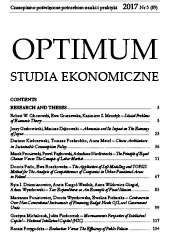Current Decentralisation Issues on Sub-Central Government Levels in OECD Countries
Current Decentralisation Issues on Sub-Central Government Levels in OECD Countries
Author(s): Peter HalmosiSubject(s): National Economy
Published by: Wydawnictwo Uniwersytetu w Białymstoku
Keywords: fiscal decentralisation;sub-central governments;crisis;local development;
Summary/Abstract: After the economic crisis of 2008, local governments performed crisis management on their own since central governments’ actions restricted individual local government actions in most countries. Thus, local policy actions brought significant results only later. In the second period – after 2011 – local government policy actions helped to overcome the negative effects of the crisis and – in some cases – paved the way for the modernisation of the local government system. This became a central issue for countries since ageing of population, shifting within the demand of local public goods and inefficient operation called for structural changes. Modernisation of local public system is a complex phenomenon and reaches far beyond the scope of this paper thus we make an attempt to summarize the general state of local decentralisation after 2008, introduce some new theoretical findings of OECD’s researches and its positive implications in member states. We argue that diverse national policy changes do not support widescale comparisons but pioneers of local government reforms will gain the most benefits of modernisation. Local government systems shall – very soon – not only bear the burden of central governments’ task and revenue sharing issues but more and more incorporate long term sustainable correlations with the educational system and local economic development – probably the most effective tools for raising competitiveness at the sub-central level.
Journal: Optimum. Economic Studies
- Issue Year: 78/2015
- Issue No: 6
- Page Range: 3-14
- Page Count: 12
- Language: English

